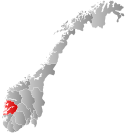Strandvik (municipality)
Strandvik Municipality
Strandvik herad | |
|---|---|
 Hordaland within Norway | |
 Strandvik within Hordaland | |
| Coordinates: 60°09′34″N 05°40′00″E / 60.15944°N 5.66667°E | |
| Country | Norway |
| County | Hordaland |
| District | Midhordland |
| Established | 1 Jan 1903 |
| • Preceded by | Fusa Municipality |
| Disestablished | 1 Jan 1964 |
| • Succeeded by | Fusa Municipality |
| Administrative centre | Strandvik |
| Area (upon dissolution) | |
• Total | 143 km2 (55 sq mi) |
| Population (1963) | |
• Total | 2,078 |
| • Density | 15/km2 (38/sq mi) |
| Time zone | UTC+01:00 (CET) |
| • Summer (DST) | UTC+02:00 (CEST) |
| ISO 3166 code | NO-1240[1] |
Strandvik is a former municipality in the old Hordaland county, Norway. It existed from 1903 until its dissolution in 1964. The 143-square-kilometre (55 sq mi) municipality encompassed the southern part of present-day Bjørnafjorden Municipality in Vestland county. It included the inner part of the Bjørnafjorden. The administrative centre of the municipality was the village of Strandvik where the Strandvik Church is located.[2]
History
[edit]On 1 January 1903, the parish of Strandvik was separated from the municipality of Fusa to form a separate municipality of its own. Initially, Strandvik had a population of 1,876. It was a small municipality and so in the early 1960s, the Schei Committee recommended that it be merged with two of its neighbors: Fusa and Hålandsdal. So, on 1 January 1964, Strandvik was merged with Hålandsdal and most of Fusa, creating a new, larger municipality of Fusa. Prior to the merger, Strandvik had a population of 2,053.[3]
Name
[edit]The municipality (originally the parish) is named after the old name for the coastal area, Strandvik (Old Norse: Strandvík) since the first Strandvik Church was built there. The first element comes from the genitive case of strǫnd which means "beach" or "shore". The last element comes from the word vík which means "bay" or "inlet".[4]
Government
[edit]During its existence, this municipality was governed by a municipal council of directly elected representatives. The mayor was indirectly elected by a vote of the municipal council.[5]
Municipal council
[edit]The municipal council (Heradsstyre) of Strandvik was made up of 15 representatives that were elected to four year terms. The party breakdown of the final municipal council was as follows:
| Party name (in Nynorsk) | Number of representatives | |
|---|---|---|
| Local List(s) (Lokale lister) | 15 | |
| Total number of members: | 15 | |
| Party name (in Nynorsk) | Number of representatives | |
|---|---|---|
| Labour Party (Arbeidarpartiet) | 3 | |
| Local List(s) (Lokale lister) | 12 | |
| Total number of members: | 15 | |
| Party name (in Nynorsk) | Number of representatives | |
|---|---|---|
| Labour Party (Arbeidarpartiet) | 2 | |
| Local List(s) (Lokale lister) | 10 | |
| Total number of members: | 12 | |
| Party name (in Nynorsk) | Number of representatives | |
|---|---|---|
| Local List(s) (Lokale lister) | 12 | |
| Total number of members: | 12 | |
| Party name (in Nynorsk) | Number of representatives | |
|---|---|---|
| Local List(s) (Lokale lister) | 12 | |
| Total number of members: | 12 | |
| Party name (in Nynorsk) | Number of representatives | |
|---|---|---|
| Labour Party (Arbeidarpartiet) | 2 | |
| Local List(s) (Lokale lister) | 10 | |
| Total number of members: | 12 | |
| Note: Due to the German occupation of Norway during World War II, no elections were held for new municipal councils until after the war ended in 1945. | ||
See also
[edit]References
[edit]- ^ Bolstad, Erik; Thorsnæs, Geir, eds. (26 January 2023). "Kommunenummer". Store norske leksikon (in Norwegian). Kunnskapsforlaget.
- ^ Store norske leksikon. "Strandvik" (in Norwegian). Retrieved 14 July 2014.
- ^ Jukvam, Dag (1999). Historisk oversikt over endringer i kommune- og fylkesinndelingen (PDF) (in Norwegian). Statistisk sentralbyrå. ISBN 9788253746845.
- ^ Rygh, Oluf (1910). Norske gaardnavne: Søndre Bergenhus amt (in Norwegian) (11 ed.). Kristiania, Norge: W. C. Fabritius & sønners bogtrikkeri. p. 197.
- ^ Hansen, Tore; Vabo, Signy Irene, eds. (20 September 2022). "kommunestyre". Store norske leksikon (in Norwegian). Kunnskapsforlaget. Retrieved 1 January 2023.
- ^ "Kommunevalgene og Ordførervalgene 1959" (PDF) (in Norwegian). Oslo: Statistisk sentralbyrå. 1960. Retrieved 16 February 2020.
- ^ "Kommunevalgene og Ordførervalgene 1955" (PDF) (in Norwegian). Oslo: Statistisk sentralbyrå. 1957. Retrieved 16 February 2020.
- ^ "Kommunevalgene og Ordførervalgene 1951" (PDF) (in Norwegian). Oslo: Statistisk sentralbyrå. 1952. Retrieved 16 February 2020.
- ^ "Kommunevalgene og Ordførervalgene 1947" (PDF) (in Norwegian). Oslo: Statistisk sentralbyrå. 1948. Retrieved 16 February 2020.
- ^ "Kommunevalgene og Ordførervalgene 1945" (PDF) (in Norwegian). Oslo: Statistisk sentralbyrå. 1947. Retrieved 16 February 2020.
- ^ "Kommunevalgene og Ordførervalgene 1937" (PDF) (in Norwegian). Oslo: Statistisk sentralbyrå. 1938. Retrieved 16 May 2020.

